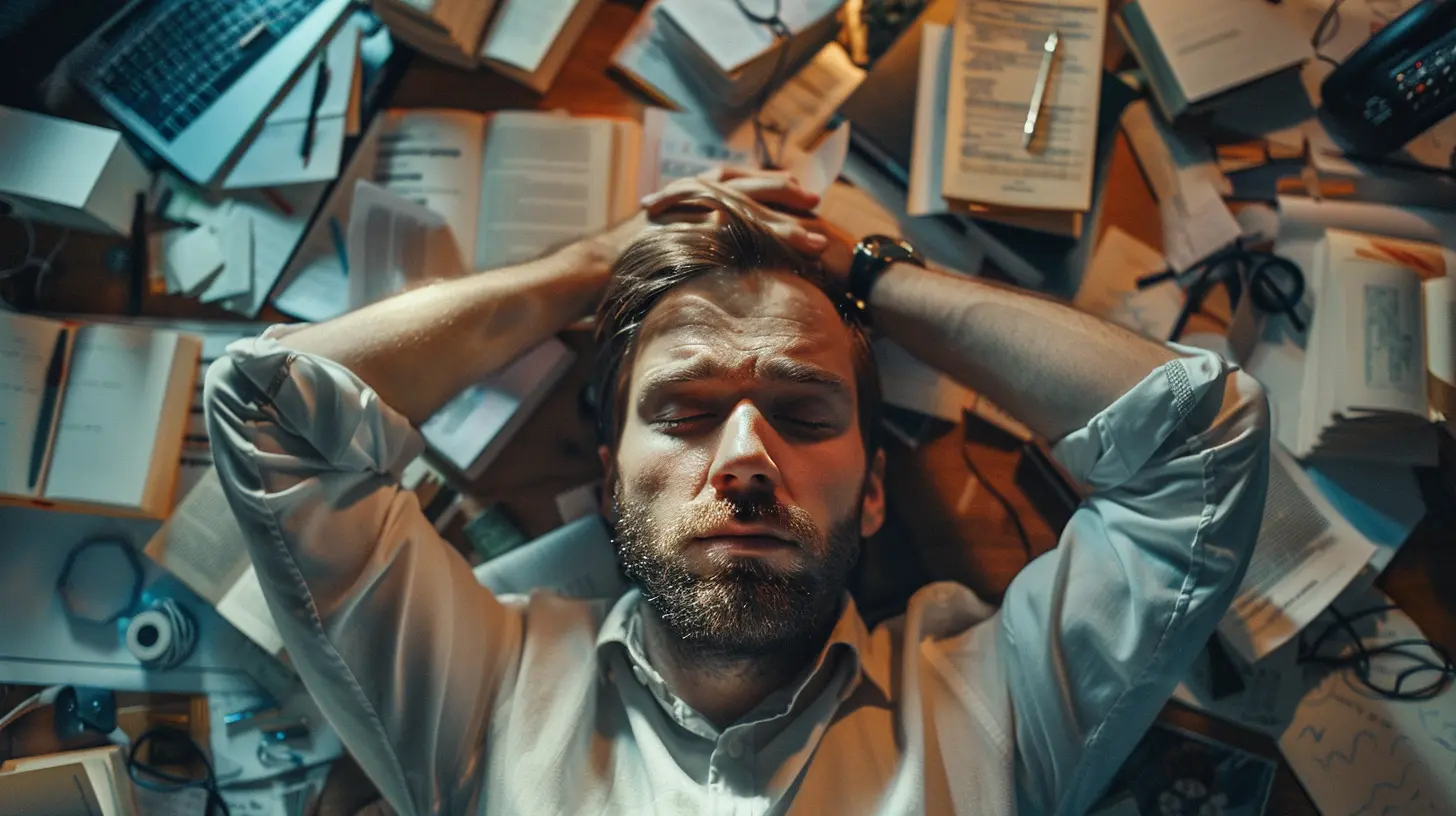Deep Work vs. Multitasking: Which Approach Cuts Down Stress?
2 June 2025
In today’s fast-paced digital world, we’re constantly pulled in a thousand different directions. Emails ping, social media buzzes, and deadlines loom like storm clouds on the horizon. Some of us juggle multiple tasks at once, believing it makes us more efficient. Others swear by deep work, tuning out distractions for undivided focus.
But which approach truly reduces stress? Is multitasking the villain we’ve made it out to be, or is deep work the secret to a calmer mind? Let's dive deep into both methods and uncover which one brings peace amidst the chaos. 
The Art of Deep Work: A Sanctuary for the Mind
Imagine this: You're in a cozy coffee shop with noise-canceling headphones, fully immersed in your work. Hours pass like minutes, and you’re completely in the zone. This state of intense focus is what productivity expert Cal Newport calls deep work.What Is Deep Work?
Deep work is the ability to concentrate without distraction on a cognitively demanding task. It requires:- Uninterrupted focus – No phone notifications, no email pop-ups, just pure concentration.
- Mental endurance – Your brain works at its highest capacity, pushing boundaries.
- Meaningful output – You accomplish more in less time, with higher quality results.
How Deep Work Reduces Stress
1. Less Mental OverloadEver feel mentally exhausted after jumping between tasks? That’s because every switch drains cognitive energy. Deep work minimizes this strain by allowing your brain to focus on one thing at a time.
2. Increased Productivity
When you get more done in less time, you avoid the stress of unfinished work piling up. You leave your desk feeling accomplished instead of overwhelmed.
3. A Sense of Flow
Deep work puts you in a flow state—a psychological condition where you lose track of time and feel fully engaged. It’s like being in sync with the universe, where work feels effortless.
4. Less Anxiety from Distractions
Constant interruptions disrupt our thoughts and increase anxiety. Deep work eliminates these distractions, allowing for a calm and focused mind. 
The Multitasking Myth: A Recipe for Chaos
Now picture this: You're responding to an email, checking your phone, attending a Zoom meeting, and trying to finish a report—all at once. Sounds productive, right? Not quite.What Is Multitasking?
Multitasking is the act of juggling multiple tasks simultaneously, switching quickly from one to another. We do it every day—scrolling social media while watching TV, replying to texts mid-conversation, or listening to podcasts while working.Why Multitasking Feels Productive (But Isn’t)
Multitasking tricks us into believing we’re accomplishing more. We feel busy, our brain gets a dopamine hit with every task switch, and we think we’re maximizing time. But in reality, we’re only creating an illusion of efficiency.How Multitasking Increases Stress
1. Cognitive OverloadOur brains aren’t designed to handle multiple attention-demanding tasks at once. Each switch drains mental energy, leaving us exhausted.
2. Shallow Work Output
Ever finish a task and realize it's full of mistakes? That’s the result of divided attention. Multitasking leads to lower-quality work, forcing us to redo tasks—wasting even more time.
3. Increased Anxiety
The constant mental juggling act creates a never-ending to-do list in our minds. We never truly "finish" anything, which increases stress levels.
4. Reduced Memory Retention
Multitasking prevents information from being stored properly. You might read an email, but by the time you switch back, you’ve forgotten what it said. 
The Science Speaks: Deep Work vs. Multitasking
Neuroscience confirms what we’ve suspected—deep work is the superior method for both productivity and stress reduction.- A Stanford University study found that chronic multitaskers performed worse in memory tests than those who focused on one task at a time.
- The American Psychological Association reports that switching tasks can cost up to 40% of productive time.
- Research on flow states suggests that deep work creates a more fulfilling and less stressful work experience.
If science backs deep work, why do we still multitask? Blame modern technology. Constant notifications and social media train our brains to crave distraction, making deep work feel difficult at first—but entirely worth it. 
How to Transition from Multitasking to Deep Work
If you’ve been a lifelong multitasker, shifting into deep work mode might feel like trying to read a book in a noisy stadium. But don’t worry—here’s how you can make the transition smoother.1. Time Blocking: Set Focus Hours
Allocate dedicated “deep work” blocks during your day. For example, work uninterrupted for 90 minutes, then take a break.2. Eliminate Distractions
- Silence phone notifications.- Close unnecessary browser tabs.
- Use apps like Freedom or Cold Turkey to block distractions.
3. Train Your Brain with Pomodoro
The Pomodoro technique (25 minutes of focused work, 5-minute break) helps build deep work endurance over time.4. Prioritize Tasks
Identify the most important tasks and dedicate deep work sessions to them. Shallow tasks like emails can wait.5. Practice Mindfulness
Meditation and deep breathing exercises help improve focus and reduce the urge to multitask.6. Give Yourself Permission to Be Bored
Constant entertainment from phone scrolling makes deep work harder. Allow yourself moments of boredom—it helps reset your brain for focus.The Verdict: Deep Work Wins for Stress Reduction
So, which approach truly cuts down stress? Without a doubt, deep work takes the crown.Multitasking leaves us mentally drained, anxious, and drowning in half-finished tasks. Deep work, on the other hand, gives us clarity, efficiency, and a sense of control over our workload.
At the end of the day, the choice is yours. Will you continue the exhausting cycle of multitasking, or will you embrace the peaceful rhythm of deep work?
One thing's for sure—your mind will thank you for choosing focus over frenzy.
all images in this post were generated using AI tools
Category:
Stress ManagementAuthor:

Arthur McKeever
Discussion
rate this article
3 comments
Dolores Jones
Great insights! Focusing on deep work can truly enhance productivity and reduce stress. Thanks for sharing!
June 13, 2025 at 3:38 PM

Arthur McKeever
Thank you! I'm glad you found the insights valuable. Deep work can indeed lead to greater focus and reduced stress.
Destiny Mason
Choose deep work for clarity and calm! Less multitasking means more peace and productivity. You got this!
June 5, 2025 at 4:41 AM

Arthur McKeever
Thank you! Embracing deep work truly fosters clarity and enhances productivity by minimizing stress.
Sandra Jackson
Great insights! Prioritizing deep work can truly enhance focus and reduce stress. It's inspiring to see how choosing one approach over multitasking can lead to a healthier mindset. Keep it up!
June 2, 2025 at 2:32 PM

Arthur McKeever
Thank you for your kind words! I'm glad you found the article insightful. Prioritizing deep work can definitely make a significant difference.



